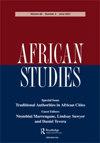The Fluidity of Patriarchy: Kinship, Tradition and the Prevention of Gendered Violence in Lugbaraland, Uganda
IF 1
4区 社会学
Q2 AREA STUDIES
引用次数: 1
Abstract
ABSTRACT In a context of rapid social change in post-conflict West Nile, Uganda, internationally funded non-governmental organisations and the state have joined efforts to reduce gender-based violence (GBV) amongst Lugbara people. That women rarely report GBV is often interpreted as an indicator that such interventions are failing because of flawed design or cultural recalcitrance. Seeking to understand women’s infrequent reporting of GBV, our research explored the relationship between a GBV intervention and local patriarchal modes of power. Focusing on ‘traditional’ modes of handling domestic violence cases, we argue that this biopolitical sphere provides a site for the reassertion of patriarchy in unexpected ways. To circumvent GBV interventions that threaten patriarchal norms male clan leaders reinvent kinship traditions. Using this case, we build upon Eric Hobsbawm and Terence Ranger’s influential ‘invention of tradition’ frame to advance theoretical understandings of the fluidity of patriarchy. The men and women who participated in our research understood domestic violence as best handled through male-controlled kinship structures that centred on bride price and land rights. Our findings provide grounds for rethinking theories of patriarchy and offer insights for anti-GBV programmes that generally privilege police and legal involvement, envisage patriarchy as fixed, and focus on the nuclear household.父权制的流动性:乌干达卢巴拉兰的亲属关系、传统与性别暴力的预防
在冲突后的西尼罗河,乌干达,国际资助的非政府组织和国家的快速社会变革的背景下,共同努力减少基于性别的暴力(GBV)在卢巴拉人。妇女很少报告性别暴力,这往往被解释为一种指标,表明此类干预措施由于设计缺陷或文化抵制而失败。为了理解女性很少报告性别暴力的原因,我们的研究探讨了性别暴力干预与地方父权权力模式之间的关系。专注于处理家庭暴力案件的“传统”模式,我们认为这种生物政治领域以意想不到的方式为父权制的重新确立提供了一个场所。为了规避威胁父权规范的性别暴力干预,男性氏族领袖重塑了亲属传统。利用这一案例,我们建立在埃里克·霍布斯鲍姆和特伦斯·兰杰有影响力的“传统发明”框架的基础上,以推进对父权制流动性的理论理解。参与我们研究的男性和女性都明白,家庭暴力最好通过男性控制的以彩礼和土地权利为中心的亲属关系结构来处理。我们的研究结果为重新思考父权制理论提供了依据,并为反性别暴力计划提供了见解,这些计划通常赋予警察和法律参与特权,将父权制视为固定的,并关注核心家庭。
本文章由计算机程序翻译,如有差异,请以英文原文为准。
求助全文
约1分钟内获得全文
求助全文

 求助内容:
求助内容: 应助结果提醒方式:
应助结果提醒方式:


